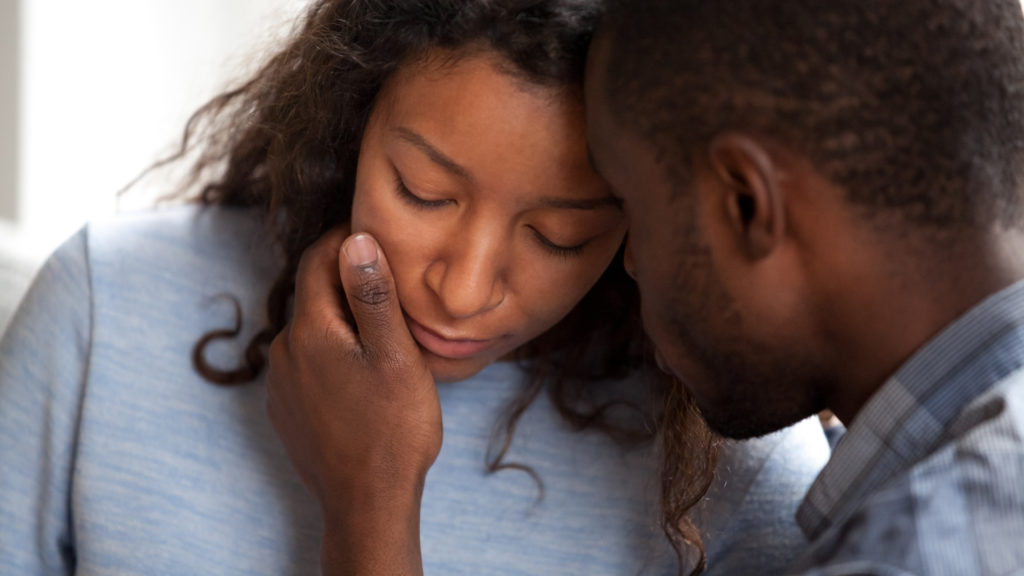Once they find out they’re pregnant, many first-time moms-to-be get swept into a whirlwind of excitement. Having a baby, especially a first one, is pretty awesome after all. While they always wonder if they’ll be great parents, for most of them, the fear of miscarriage isn’t part of the picture.
But miscarriage does happen. According to Womenshealth.gov, of every 100 pregnancies, 10 to 15 will result in loss of the fetus. A majority of losses occur before the eighth week. Those that happen before the 20-week point are miscarriages. Those that occur later are termed stillbirths.
How a prospective parent copes with a child he or she has never seen and will never see often depends on whether the loss is a first miscarriage. The initial reaction of most women suffering a first loss is shock. For those with multiple miscarriages, a sense of profound sadness is typical.
It’s common for many women who’ve suffered miscarriages feel guilty, lonely and even angry with themselves and other family members. They wonder if they did something wrong. In fact, a woman has no control over the circumstances that caused a miscarriage most of the time. The baby might just fail to develop – a condition known as a blighted ovum – or might not have developed normally due to a chromosomal abnormality.
After their loss, these women report feeling upset for long periods. Seeing pregnant women or those with children can be unsettling. Sometimes they experience physical sensations such as hollowness in the stomach or tightness in the chest.
Going through a grief process that includes stages of denial, guilt, anger, depression, envy and yearning is normal. Events like a baby shower can trigger strong emotions. Ways to move toward healing and happiness include making your own decisions about clearing out signs of the baby you lost, creating memories through activities such as memorials or naming the baby, taking days slowly, focusing on the present and journaling.
When grieving goes on so long that it seems impossible to return to anything resembling a normal routine, it’s time to seek help. Some of the best sources are friends and family members, a spouse of partner, a support group and a grief counselor.
Trying to get pregnant again seems almost unimaginable to those who have just experienced a miscarriage. However, when they eventually consider another pregnancy, it’s important to know that most losses are one-time events. Fewer than 5 percent of women suffer two miscarriages in a row, and only around 1 percent experience three.
One way for couples who’ve experienced at least two miscarriages to overcome their fear of another pregnancy is by acting objectively. For them, it’s wise to see a gynecologist for blood tests and chromosomal studies to help determine the cause before attempting a subsequent pregnancy.
When’s the best time to try to get pregnant again? It’s after physical and emotional healing. While for most women, it’s all right to try after the first menstrual period following a miscarriage, the treating OBGYN has specific advice on when it’s safe.
The University at Buffalo, SUNY says that during a pregnancy following a miscarriage, many women remain detached from the idea that they’re actually pregnant. Instead of imagining what the child might look like, they say they don’t really feel like they’re having a baby until late in the pregnancy. Sometimes a conversation with a friend or the arrival of a baby gift makes them realize that this pregnancy is really going to term, and it’s okay to get excited about it.
My first child was 4 when I became pregnant again. An only child, I was determined that my daughter not suffer the same fate. Planning for the pregnancy included systematically getting off medications for Crohn’s disease. I was 35, which was the upper age limit I had decided was medically safe for another pregnancy. At around 7 weeks, I began to spot. A 9-week ultrasound confirmed the fetus was no longer viable. While waiting for a scheduled D & C, I started hemorrhaging and had to have the procedure on an emergency basis. Since my husband and I separated shortly afterward, I didn’t have a chance to consider trying again.
A miscarriage is a huge loss for many families and a time to grieve. However, for those ready to smile again and aim for another pregnancy, the odds of not miscarrying are excellent. A time of joy and laughter could be just nine months away. If you have questions about miscarriages or conception, please contact us! We’d be happy to help you.

